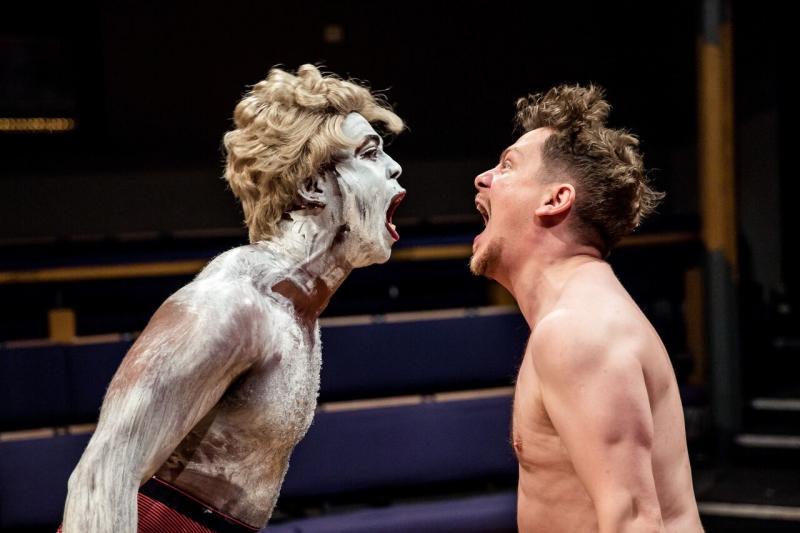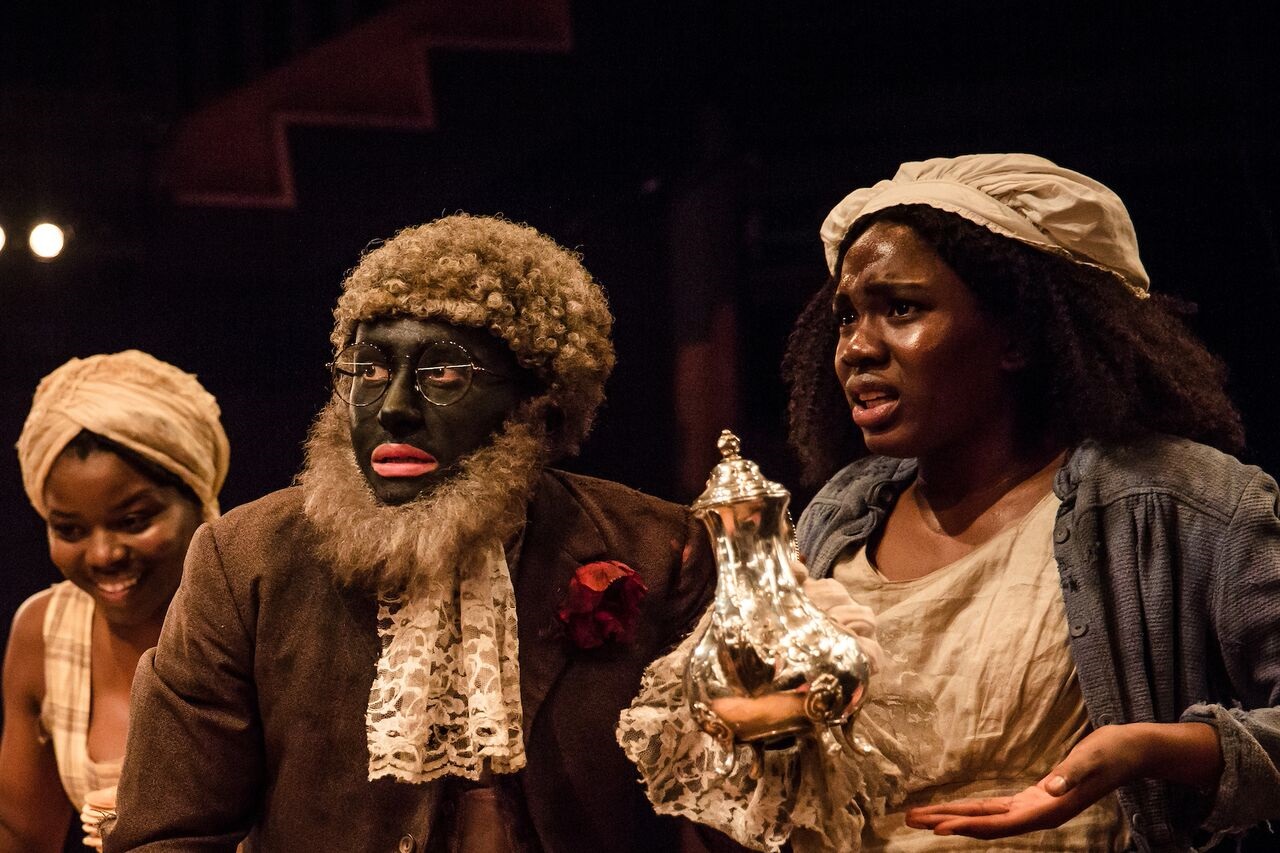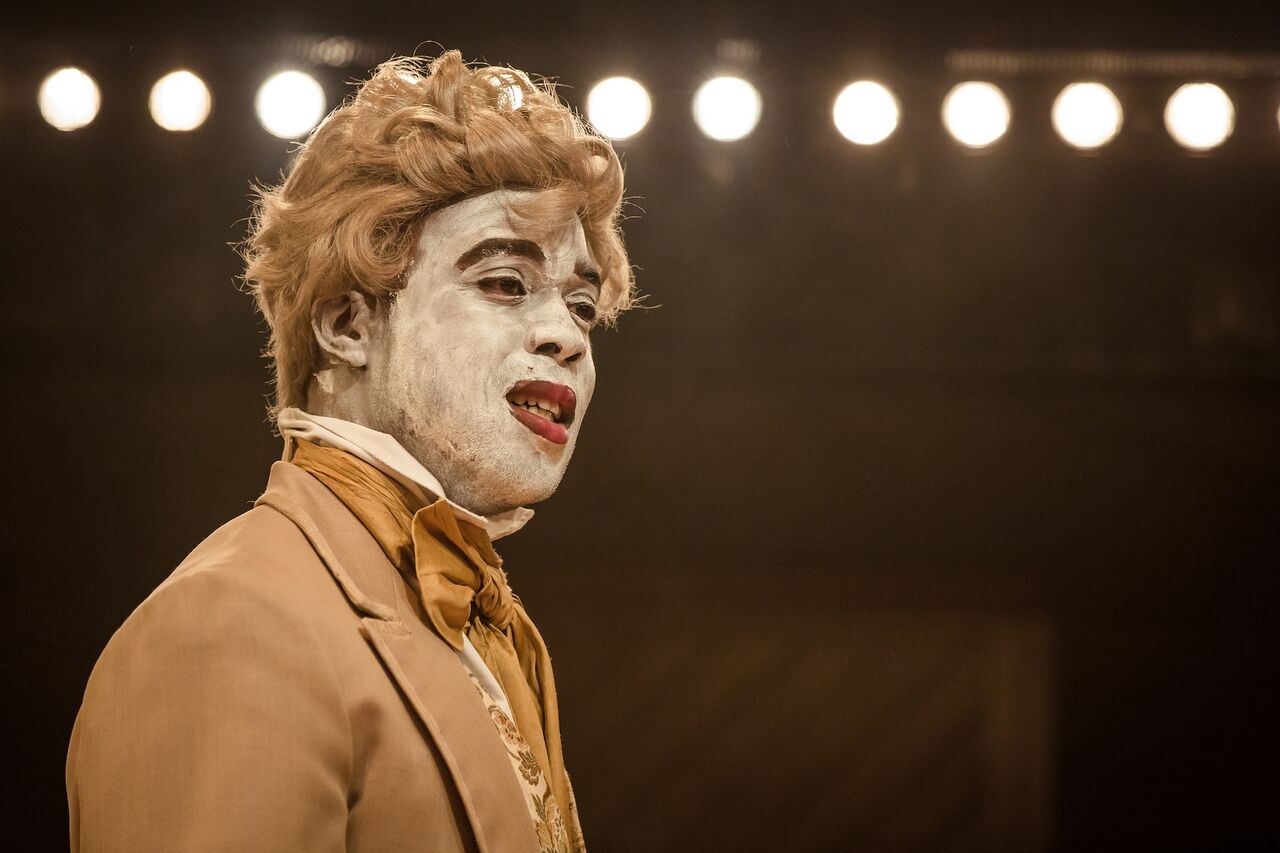An Octoroon review - slavery reprised as melodrama in a vibrantly theatrical show | reviews, news & interviews
An Octoroon review - slavery reprised as melodrama in a vibrantly theatrical show
An Octoroon review - slavery reprised as melodrama in a vibrantly theatrical show
A major work of new American drama receives its European premiere at Richmond’s Orange Tree Theatre

Make no mistake about it, Branden Jacobs-Jenkins is a playwright to watch.
An Octoroon is a cracking piece of writing. Jacobs-Jenkins has taken on that defining American subject, slavery, and deconstructed it via the prism of an 1859 melodrama by the great 19th century theatrical warhorse, Dion Boucicault. A runaway hit in its time, Boucicault’s The Octoroon – the difference between the two titles is their determiner, no more, and we're left to ponder the implications of that change – played on the uneasy sentiments of antebellum America: the word itself refers to one who is one-eighth black by blood, a detail of miscegenation on which Boucicault’s story crucially swung. That borrowing is a stroke of inspiration in itself – melodrama being a self-referential genre, the satiric contexts of then and now contrast very nicely – but it’s the richness of Jacobs-Jenkins’s own imagination that really sets this show soaring.
Jacobs-Jenkins demands impossible agility from his central character
Just how do you deconstruct a tale of slavery, and the challenge of writing about it today? Jacobs-Jenkins hits on the device of a prologue, “the act of dramatic composition”, in which a writer, BJJ – the initials give it away – riffs on the problems he faces in creating the work we are about to see. “Hi, everyone. I’m a black playwright,” he introduces himself, the actor Ken Nwosu naked before us, except for pants and socks.
BJJ somewhat mischievously appraises the challenge of his position: “Black playwright. I can’t even wipe my ass without someone trying to accuse me of deconstructing the race problem in America.” It becomes even more incongruous from the fact that, as he talks, Nwosu is applying whiteface. When you ask a white actor to play a racist these days, BJJ explains, they run screaming. So to get his show on the road (black) BJJ will be doubling its (white) lead male roles, its hero George, the newly-arrived inheritor of a Louisiana plantation, and villain, the dastardly M’Closky who’s determined to take it from him. But that’s not the limit of Jacobs-Jenkins’s invention. BJJ’s monologue is interrupted by the appearance of another self-obsessed soliloquiser, whom we quickly realise is a playwright too. Then, after the two have exchanged a furious “Fuck you!” barrage at one another, the penny drops: the sozzled Irishman is BJJ’s partner in crime, as it were, Dion fecking Boucicault, no less. It only needs for him (Kevin Trainor) to put on the redface – for the American Indian role – and an assistant (white, Alistair Toovey) to surface and black himself up to play the male slave roles, and this unlikely production-within-a-production is ready to go.
But that’s not the limit of Jacobs-Jenkins’s invention. BJJ’s monologue is interrupted by the appearance of another self-obsessed soliloquiser, whom we quickly realise is a playwright too. Then, after the two have exchanged a furious “Fuck you!” barrage at one another, the penny drops: the sozzled Irishman is BJJ’s partner in crime, as it were, Dion fecking Boucicault, no less. It only needs for him (Kevin Trainor) to put on the redface – for the American Indian role – and an assistant (white, Alistair Toovey) to surface and black himself up to play the male slave roles, and this unlikely production-within-a-production is ready to go.
Varied strands jostle for attention at the Terrebonne Plantation to which the action then moves. The absurdities of melodrama, particularly when its conventions are reappraised in hindsight, make for an enjoyable layer of parody throughout, literally so in the case of Dora, the Southern belle who's played to the rooftops by Celeste Dodwell. Meanwhile the two women house slaves, Minnie (Vivian Oparah) and Dido (Emmanuella Cole), act as a kind of chorus, observing developments – but they’re speaking in the distinctive black street language of today (“Ain’t nobody told us, neither, nigga!”). (Pictured above: Emmanuella Cole, Alistair Toovey, Vivian Oparah)
 There’s a growing unease that comes partly from the script – a huge-headed Br’er Rabbit, from the Uncle Remus folktales that are another legacy of plantation life, drops in and out of the action – and partly from Ned Bennett’s staging. The interludes between the five acts are defined by deafening blasts of aural storm (George Dennis, sound), alternating between darkness and strobe effects (Elliot Griggs, lighting). Theo Vidgen’s score plays in close sync throughout, including masterful use of live solo cello (played by James Douglas) in counterpoint.
There’s a growing unease that comes partly from the script – a huge-headed Br’er Rabbit, from the Uncle Remus folktales that are another legacy of plantation life, drops in and out of the action – and partly from Ned Bennett’s staging. The interludes between the five acts are defined by deafening blasts of aural storm (George Dennis, sound), alternating between darkness and strobe effects (Elliot Griggs, lighting). Theo Vidgen’s score plays in close sync throughout, including masterful use of live solo cello (played by James Douglas) in counterpoint.
Bristling towards a frenzied conclusion, Bennett achieves things you’d never expect, even from the Orange Tree’s versatile space. Jacobs-Jenkins demands almost impossible agility from his central character, as George and M’Closky wrestle one another in the bravura climax of Nwosu’s performance (Ken Nwosu, pictured above). Does the complexity of some of the later business get in the way? Occasionally. But this an effervescent production of a richly imaginative play. Jacobs-Jenkins evokes all the stage panache of his now-forgotten predecessor and melds it together with an invigorating post-modern twist. An Octoroon is vital drama, in every sense of the word.
rating
Explore topics
Share this article
The future of Arts Journalism
You can stop theartsdesk.com closing!
We urgently need financing to survive. Our fundraising drive has thus far raised £49,000 but we need to reach £100,000 or we will be forced to close. Please contribute here: https://gofund.me/c3f6033d
And if you can forward this information to anyone who might assist, we’d be grateful.

Subscribe to theartsdesk.com
Thank you for continuing to read our work on theartsdesk.com. For unlimited access to every article in its entirety, including our archive of more than 15,000 pieces, we're asking for £5 per month or £40 per year. We feel it's a very good deal, and hope you do too.
To take a subscription now simply click here.
And if you're looking for that extra gift for a friend or family member, why not treat them to a theartsdesk.com gift subscription?
more Theatre
 Othello, Theatre Royal, Haymarket review - a surprising mix of stateliness and ironic humour
David Harewood and Toby Jones at odds
Othello, Theatre Royal, Haymarket review - a surprising mix of stateliness and ironic humour
David Harewood and Toby Jones at odds
 Macbeth, RSC, Stratford review - Glaswegian gangs and ghoulies prove gripping
Sam Heughan's Macbeth cannot quite find a home in a mobster pub
Macbeth, RSC, Stratford review - Glaswegian gangs and ghoulies prove gripping
Sam Heughan's Macbeth cannot quite find a home in a mobster pub
 The Line of Beauty, Almeida Theatre review - the 80s revisited in theatrically ravishing form
Alan Hollinghurst novel is cunningly filleted, very finely acted
The Line of Beauty, Almeida Theatre review - the 80s revisited in theatrically ravishing form
Alan Hollinghurst novel is cunningly filleted, very finely acted
 Wendy & Peter Pan, Barbican Theatre review - mixed bag of panto and comic play, turned up to 11
The RSC adaptation is aimed at children, though all will thrill to its spectacle
Wendy & Peter Pan, Barbican Theatre review - mixed bag of panto and comic play, turned up to 11
The RSC adaptation is aimed at children, though all will thrill to its spectacle
 Hedda, Orange Tree Theatre review - a monument reimagined, perhaps even improved
Scandinavian masterpiece transplanted into a London reeling from the ravages of war
Hedda, Orange Tree Theatre review - a monument reimagined, perhaps even improved
Scandinavian masterpiece transplanted into a London reeling from the ravages of war
 The Assembled Parties, Hampstead review - a rarity, a well-made play delivered straight
Witty but poignant tribute to the strength of family ties as all around disintegrates
The Assembled Parties, Hampstead review - a rarity, a well-made play delivered straight
Witty but poignant tribute to the strength of family ties as all around disintegrates
 Mary Page Marlowe, Old Vic review - a starry portrait of a splintered life
Tracy Letts's Off Broadway play makes a shimmeringly powerful London debut
Mary Page Marlowe, Old Vic review - a starry portrait of a splintered life
Tracy Letts's Off Broadway play makes a shimmeringly powerful London debut
 Little Brother, Soho Theatre review - light, bright but emotionally true
This Verity Bargate Award-winning dramedy is entertaining as well as thought provoking
Little Brother, Soho Theatre review - light, bright but emotionally true
This Verity Bargate Award-winning dramedy is entertaining as well as thought provoking
 The Unbelievers, Royal Court Theatre - grimly compelling, powerfully performed
Nick Payne's new play is amongst his best
The Unbelievers, Royal Court Theatre - grimly compelling, powerfully performed
Nick Payne's new play is amongst his best
 The Maids, Donmar Warehouse review - vibrant cast lost in a spectacular-looking fever dream
Kip Williams revises Genet, with little gained in the update except eye-popping visuals
The Maids, Donmar Warehouse review - vibrant cast lost in a spectacular-looking fever dream
Kip Williams revises Genet, with little gained in the update except eye-popping visuals
 Ragdoll, Jermyn Street Theatre review - compelling and emotionally truthful
Katherine Moar returns with a Patty Hearst-inspired follow up to her debut hit 'Farm Hall'
Ragdoll, Jermyn Street Theatre review - compelling and emotionally truthful
Katherine Moar returns with a Patty Hearst-inspired follow up to her debut hit 'Farm Hall'
 Troilus and Cressida, Globe Theatre review - a 'problem play' with added problems
Raucous and carnivalesque, but also ugly and incomprehensible
Troilus and Cressida, Globe Theatre review - a 'problem play' with added problems
Raucous and carnivalesque, but also ugly and incomprehensible

Add comment